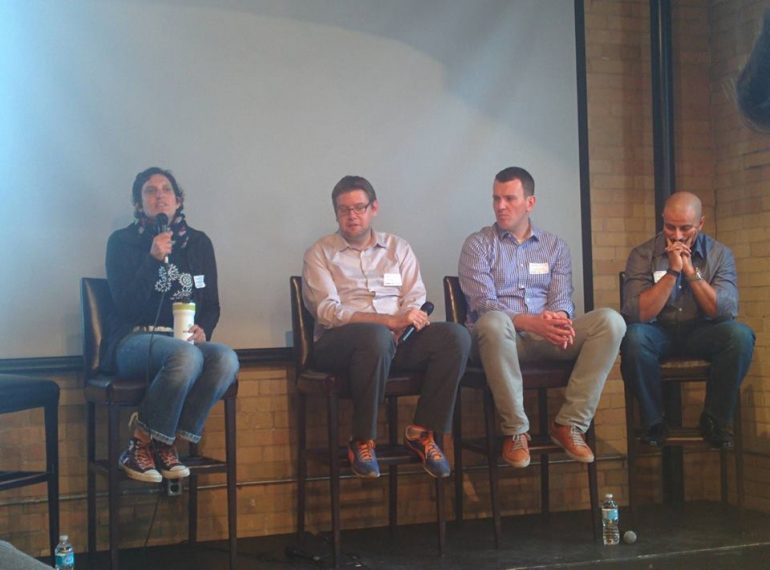Deep learning and artificial intelligence are set to be the next big innovations that change the way that people run their businesses. At Shopify, Pivotal, and gdR’s Tech @ Scale in Toronto — an event that included a day full of talks exploring how developers and engineers could stay agile in a world of fast-moving technology — one talk included expert insights on exactly how these emerging technologies would impact both businesses and their customers.
“The fabric of the internet is not ready to scale for what’s coming. If you think of the components we built our service on top of, the one part that is not ready to scale is security because it is the most centralized.”
– Karl Martin, Nymi
Chris Matys, chief analytics officer at Georgian Partners, moderated a panel featuring Damian McCabe, VP of Engineering at Connected Lab; Hesham Fahmy, VP of Technology at ecobee; Inmar Givoni VP of Big Data at Kobo; and Karl Martin, co-founder and CTO of Nymi.
“A lot of business innovation took off when we started to get into the areas of predictive scoring and into the area of prescriptive actions, and that’s where we transitioned from human-built roles and analysis to more complex machine generated models and automation,” said Matys. “Today, virtually every business in every industry is taking steps to become analytically optimized so we’re at the height of that trend.”
Givoni agreed that the rise of machine and deep learning technologies and AI is a result of the technology becoming more accessible to people without specialized knowledge.
“It’s a combination of data, fast computing, and machine learning technology,” she said. “And what happened is an interesting phenomenon where people were able to build and start creating a lot of infrastructure — so with that infrastructure, it is so much easier for practitioners who don’t necessarily have deep knowledge of machine learning and AI to start building. We have an influx now of people trying to pick up big data and machine learning and AI.”
Chat bots are one of the hot developments in the tech space right now, as tech giants like Facebook announce their commitment to chat bots and companies across industries, from retail to news, explore how to use chat bots to reach customers. More people are moving away from the “apps are everything” mentality — and McCabe, whose work at Connected Lab requires him to apply emerging technologies to “first-of-its-kind” apps, said that conversational interfaces are the next must-have for businesses.
“AI and some of the aggregations happening around conversational interfaces are providing new opportunities for business to have a presence in some way inside these conversational interfaces,” he said. He gave the example of WeChat in China, which allows its users to launch services like ferry ticket purchases or controlling a TV all from one place, rather than skimming through various apps and having to fill out your payment information repeatedly. “[Aggregations] can be inside of a messaging client, or through a voice interface utility you have in your home. There’s lots of new opportunities for products and services to integrate themselves or part of their services into one of these AI agents, and deliver and reach customers in a new way.”
Myth busting about pairing with @fnthawar at https://t.co/XKmQfbo4Oc pic.twitter.com/TuOQxjwg1A
— Jean-Michel Lemieux (@jmwind) June 2, 2016
However, the technology may have its limitations. Martin said that developing this technology securely goes beyond establishing trust between entities. “The fabric of the internet is not ready to scale for what’s coming. If you think of the components we built our service on top of, the one part that is not ready to scale is security because it is the most centralized,” Martin said.
“When you want to move to a new type of ad hoc where your devices can show up and disappear, you want to have secure channels to those devices and you want to be able to authenticate if they’re the right device and if that signal is authentic. It’s not just about ‘Hey if I trust this service provider they’ll do better business’, they can’t even provide the services they want to until we come up with new approaches.”
And going beyond security, there is also an issue about who owns data that is stored in the cloud. As more people adopt IoT devices in their homes, it will become increasingly important to determine if people have sole ownership over their data.
“I’ve got all these IoT devices recording where I am,” said Fahmy. “But who owns it? Is it me? I think of something as innocuous as my thermostat, but knowing that my thermostat has a schedule of when I’m home or not home, who do I want to know that? Am I being hacked in terms of how data gets out?”
Normally, cybersecurity means locking people out of a system, detecting intrusions, and patching up any holes should any hackers get in. In contrast to Martin’s point, Fahmy gave an alternative, more positive view of how AI could help security issues.
“AI can come in, and it can watch in real time how the system and people are behaving, and how IoT devices are sending or receiving data. Could that become our perimeter detection?”


